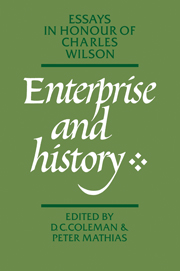Book contents
- Frontmatter
- Contents
- Preface
- List of contributors
- Part I Images and interpretations
- Part II England and the Low Countries in pre-industrial times
- Part III Enterprise, finance and politics in the modern world
- 10 The Bank of Rome and commercial credit, 1880–1914
- 11 The scientific brewer: founders and successors during the rise of the modern brewing industry
- 12 Large firms in Belgium, 1892–1974: an analysis of their structure and growth
- 13 ‘No bloody revolutions but for obstinate reactions’? British coalowners in their context, 1919–20
- 14 French oil policy, 1917–30: the interaction between state and private interests
- 15 Reflections on the Dutch economic interests in the East Indies
- Bibliography of Charles Wilson's published works
- Index
15 - Reflections on the Dutch economic interests in the East Indies
Published online by Cambridge University Press: 12 March 2010
- Frontmatter
- Contents
- Preface
- List of contributors
- Part I Images and interpretations
- Part II England and the Low Countries in pre-industrial times
- Part III Enterprise, finance and politics in the modern world
- 10 The Bank of Rome and commercial credit, 1880–1914
- 11 The scientific brewer: founders and successors during the rise of the modern brewing industry
- 12 Large firms in Belgium, 1892–1974: an analysis of their structure and growth
- 13 ‘No bloody revolutions but for obstinate reactions’? British coalowners in their context, 1919–20
- 14 French oil policy, 1917–30: the interaction between state and private interests
- 15 Reflections on the Dutch economic interests in the East Indies
- Bibliography of Charles Wilson's published works
- Index
Summary
It is about twenty years ago that, on several occasions, Charles Wilson and I discussed the consequences which the post-war political developments in the world would have for those Western business enterprises which of old had their main business in the colonies. Wilson had just written his second survey of the history of Unilever (Unilever 1945–1965: Challenge and Response in the Post-War Industrial Revolution) and I had adapted that publication for the Netherlands edition (Unilever in de tweede Industriele Revolutie 1945–1965). However, I was at the same time deeply involved in a study of post-war developments in the former Netherlands East Indies and of the radical changes following the transfer of sovereignty over that territory. In the early sixties the Netherlands had already experienced the loss of its empire and the relations between the Dutch and the Indonesians had fallen to their lowest point. The Dutch government's policy, pursued in the East Indies during the first period of revolt between 1945 and 1949, and the additional efforts after 1949 to maintain close and workable relations with independent Indonesia, had within thirteen years failed completely.
During those years the Netherlands experienced a very difficult time. It started immediately after the ending of the disastrous Japanese occupation of the East Indies, when the Dutch were not immediately allowed to re-establish their rightful administrative and military positions. From that early beginning the process of decolonization was certainly far from straightforward.
- Type
- Chapter
- Information
- Enterprise and HistoryEssays in Honour of Charles Wilson, pp. 263 - 277Publisher: Cambridge University PressPrint publication year: 1984



